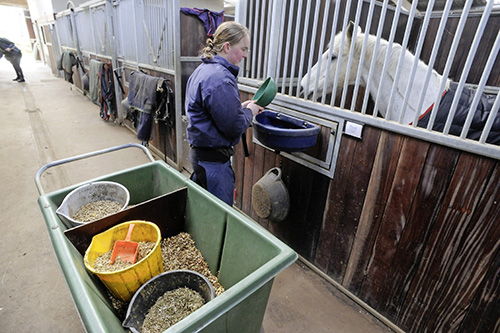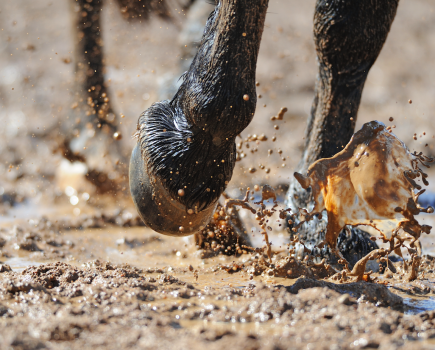Starch in horse feed is often seen as a bad thing but although it can be damaging if fed to a horse in excess, starch is a vital part of a horse’s diet and it is present in most plant matter. Starch is in high quantities in cereals and in lower volumes in forage and grass, so knowing when to feed it and why is important.
“Not all feeds are high in starch, it depends on the type of feed and the type of horse or workload the feed is designed for,” explains Spillers nutritionist Clare Barfoot. “Mixes are always higher in starch than cubes, because they contain flaked cereals for visual appeal for both horse and human.
“If you have a pony or a horse that you use for leisure riding, they don’t often need the extra calories supplied by compound feed, and it’s never advisable to feed native ponies cereal-based feeds. In these types a fibre-based feed fed alongside a balancer is most suitable.
“Although sugar and starch should be restricted in some horse’s diets, especially in those prone to laminitis, some cereal starch in the diet can be beneficial,” continues Clare. “In very hard working horses especially those in regular work starch can help replenish glycogen stores.”
Why starch in horse feed is important
Starch is digested in the small intestine, producing glucose (sugar). This glucose is stored in your horse’s muscles as glycogen and is used to fuel exercise and normal bodily processes.
“Horses in light work probably don’t need too much starch in the diet, and usually do well on high-fibre feeds. Those in hard work will benefit from starch-rich feeds to maximise muscle glycogen stores. Feeding starch will also speed up post-exercise recovery,” says Olivia Colton, senior nutritionist at Feedmark.
“If a horse is in hard work and needs a starchy feed to supply energy, try to feed many small feeds rather than two big ones for optimal digestive health. It’s also recommended to feed these meals with a fibre source, to slow passage through the digestive tract. Feed processed grains (these are any that have been rolled, crushed for example) as these are easier to digest, meaning less will get to the hind gut undigested.”
When feeding starch is a problem
Some horses will do better on a low-starch diet, and a vet or nutritionist may advise avoiding high-starch feeds in certain situations. Olivia highlights the following as reasons why a horse or pony should not eat too much starch:
- Horses on high-starch diets will be more likely to suffer from gastric ulcers.
- If large high-starch feeds are given, there’s a chance of starch reaching the hind gut undigested, which can lead to colic, hind gut acidosis and laminitis.
- High-starch diets are also not recommended for horses with metabolic and muscular problems, including equine metabolic syndrome, Cushing’s disease and Rhabdomyolysis (azoturia/’tying up’).
Building condition
To build and improve a horse’s condition, you need to supply calories in their diet above and beyond those that are needed for maintenance, alongside quality protein to help develop muscle and topline.
“A traditional conditioning feed might jump off the shelf at you because it says exactly what you’re looking for right there on the bag, but here’s the question: is what’s inside going to be the best bet for your horse?” asks Clare Barfoot.
“All conditioning mixes contain cereals and the downside of cereals is that they contain high levels of starch. While this can result in the turbo injection of extra energy you need, it can also generate unwanted and perhaps unmanageable fizz in some horses and ponies.”
According to Clare, starch may also contribute to fractious behaviour in a horse if you feed it in high quantities as it can overwhelm their digestive system. This causes acidity in the hindgut, which can lead to discomfort.
“Feeding well is all about choosing the most suitable feed for your horse’s needs,” states Clare. “If you’ve been advised to keep starch out of your horse’s diet there are now plenty of options available to help keep the starch to a minimum. Talk to your nutritionist for more information on planning a tailored diet for your horse.”
Love hacking? Join our free #Hack1000Miles challenge and see how far you can go!
Subscribe to Your Horse Magazine – the perfect Christmas gift!










